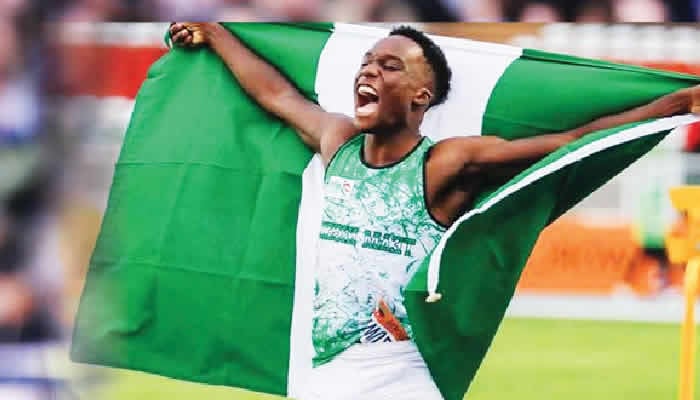Paragraph 1: Onwuzurike’s Semi-Final Challenge and Exit
Udodi Onwuzurike, the Nigerian sprinter carrying the nation’s hopes in the men’s 200m at the World Athletics Championships in Tokyo, saw his journey come to a premature end in the semi-finals. Pitted against a formidable lineup that included reigning champion Noah Lyles, Olympic gold medalist Andre De Grasse, and British contender Zharnel Hughes, Onwuzurike faced an uphill battle from the start. Despite exploding off the blocks with a lightning-fast reaction time of 0.119 seconds, the young Nigerian couldn’t maintain the pace against the seasoned competitors. As the race wore on, Onwuzurike faded in the latter half, ultimately finishing seventh in his heat with a time of 20.26 seconds. This result placed him well outside the qualifying positions, both automatic and non-automatic, effectively ending his campaign in Tokyo.
Paragraph 2: The Dominant Display of Noah Lyles and Other Qualifiers
While Onwuzurike’s campaign faltered, Noah Lyles cemented his status as the man to beat in the 200m, delivering a breathtaking performance. Clocking in at a blistering 19.51 seconds, Lyles not only won his semi-final heat but also etched his name in the history books with the fastest-ever semi-final time in the championship’s history. This stunning run surpassed even his own world-leading time set at the US trials, further solidifying his dominance in the event. Trailing Lyles, Zharnel Hughes secured his spot in the final with a time of 19.95 seconds. South Africa’s Sinesipho Dambile also produced a remarkable run, setting a personal best of 19.97 seconds to claim the third automatic qualifying position. Even Zimbabwe’s Tapiwanashe Makarawu joined the sub-20-second club with a time of 19.98 seconds, though it wasn’t enough for qualification.
Paragraph 3: Onwuzurike’s Disappointing Outcome and Nigeria’s Remaining Hopes
Onwuzurike’s early exit was a significant blow to Nigeria’s aspirations in the championships. Having arrived in Tokyo with a personal best of 19.76 seconds and a strong showing in the heats, where he finished just behind the highly-rated Kenneth Bednarek, expectations were high for the young sprinter. Many hoped he would advance to the final and bolster Nigeria’s representation on the track. His elimination leaves Ezekiel Nathaniel as the sole Nigerian male finalist in track events, having secured a historic qualification in the 400m hurdles. With Tobi Amusan’s silver medal in the women’s 100m hurdles as Nigeria’s only medal thus far, the nation’s attention now turns squarely to Nathaniel’s final performance.
Paragraph 4: Lyles’ Pursuit of History and the Implications for the Final
Lyles’ exceptional semi-final performance sets the stage for a thrilling final, with the American sprinter firmly in the driver’s seat. His display signaled a clear intent to capture his fourth consecutive world title in the 200m, a feat that would place him in the esteemed company of sprinting legend Usain Bolt. The final promises a clash of titans, with Lyles’ dominance challenged by other formidable contenders who have demonstrated their prowess in the earlier rounds. The question remains as to whether anyone can match Lyles’ scorching pace and prevent him from etching his name further into sprinting history.
Paragraph 5: Analyzing Onwuzurike’s Performance and Future Prospects
While the outcome in Tokyo was undoubtedly disappointing for Onwuzurike, it’s crucial to view his performance within the context of his young career and the challenging circumstances of the race. Facing seasoned veterans and Olympic medalists in a high-pressure environment, Onwuzurike’s inability to maintain his initial burst of speed is not necessarily indicative of a lack of potential. At 22 years old, he still has ample time to refine his technique, improve his endurance, and develop the tactical acumen required to compete at the highest level. This experience in Tokyo, though difficult, will likely serve as a valuable learning opportunity, providing him with insights and motivation to push his boundaries in future competitions.
Paragraph 6: The Broader Context of Nigeria’s Track and Field Performance
Onwuzurike’s performance, while disappointing in isolation, also reflects some of the broader challenges facing Nigerian track and field. Despite producing talented athletes, Nigeria often struggles to translate that potential into consistent success on the global stage. Factors such as limited resources, inadequate training facilities, and a lack of consistent high-level competition can hinder the development of athletes like Onwuzurike. Going forward, investing in infrastructure, coaching expertise, and athlete support systems will be crucial to maximizing Nigeria’s track and field talent and achieving greater success in future international competitions.














